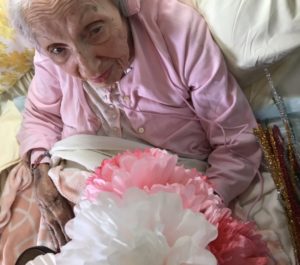Eliza’s Caregiving Hacks: 3 creative ways to care for someone with dementia
Every Monday on social media we post a new #CaregivingHack—i.e. a creative approach to a daily caregiving task. Here, we’ve collected the latest blogs about caregiving tips and tricks millennial caregiver Eliza has learned while caring for her grandmother AJ, who has dementia.

Tip #1: Give them creative freedom.
Something simple that I often forget about is the creative freedom of dressing yourself. Being able to go through your closet to pick an outfit, then accessorizing to match.
This is something my grandmother has loved doing her entire life. Her outfits were always fully conceptualized and gorgeously coordinated. That slowly went away as her independence waned, and now, unless we’re intentional about it, she is dressed without any say in what goes on her body.
But of course this takes time and energy that we don’t always have, and mornings are often busy, busy.
So whenever it’s a special occasion or we’re having company over, we try to take the time to let my grandmother pick out her clothes from a few options; we let her choose her jewelry and her lipstick shade and her perfume; and if she’s loving every second of it like she usually is, we’ll pull out some of her old accessories she used to wear like her silk scarves, her bold pins, her fancy belts, feathery hats and dainty gloves, and we let her get creative with it.
Of course this can’t be done every day. It is draining to pull it all out, to “ooh” and “aah” over every piece she chooses. But when we have the time and we both have the energy, it’s a fun way to spend the morning, and it always puts her in a good mood to be able to get all dolled up.
How do you think you could give the person for whom you care some of their creative freedom back? Let’s put our heads together!!
Tip #2: Be a little irrational sometimes.
If you’re out and see something random that makes you smile, every once in a while go ahead and buy it for the person for whom you care! It is a guaranteed way to make a day a little bit more lively and a little bit different than the one before.
Irresponsible things we’ve gotten to make my grandmother smile: bubble machine, clown nose, bedazzled hairbrush, bright blue cookie dough, mermaid sequin pillow, costume jewelry, jingle bell slippers…sometimes it’s for her birthday or Christmas, but it’s much more fun when it’s a random day and you bring home an unexpected surprise.
This shouldn’t cost a lot, either! This letter board was $6. Check thrift shops, clearance aisles, even the back of your closet! There’s just something magical about the unexpected.
Tip #3: Let’s talk about dementia conversations.
Many people are intimidated or uncomfortable with talking to people who struggle with memory problems. And that’s normal! I would be too (and I have been!) if I hadn’t been surrounded by it since before I was in high school. It’s become such a part of life now that I don’t think about it much, but figured it might be helpful to share some things I’ve learned along the way.
Think of this conversation like a conversation in an improv scene. You have no idea what’s going to be said next, so you answer with “yes, and…” to continue the conversation and to make them feel understood.
In this conversation with my grandmother I had NO idea what she was talking about. I don’t know if it was a memory from when she was younger, if it was a dream, if she was just making up a story, if she’d read this scene somewhere…no clue! So I went off of her emotions and cues.
If she’s laughing hysterically, I laugh just as hard. Because whether or not I know what’s so funny, nobody wants to be the only one laughing!! Conversations are about sharing an experience.
If she says that we did something together (like climb over a fence) then in that moment, we DID climb over a fence. And it was funny! I add small details and let her lead with the big ones.
The main goal in these conversations isn’t really to have a successful, meaningful, mutually understood conversation. The days of reminiscing are, for the most part, behind us (though some days she has a lucid moment!) Conversations now are really to make her feel understood, to remind her that she’s not alone, and to allow her to have these bonds of friendship still. And they are just as precious, because they are just as real to her, and just as important to me.

Comments
Post a Comment